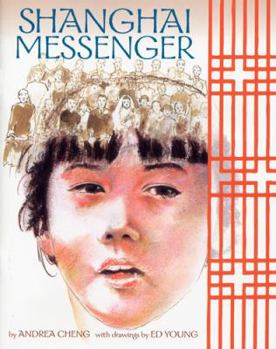Shanghai Messenger
Select Format
Select Condition 
Book Overview
Asian/Pacific American Award for Literature - Asian/Pacific American Librarians Association (APALA)A story in verse of a biracial Chinese American girl's journey to self-discovery and love of family... This description may be from another edition of this product.
Format:Hardcover
Language:English
ISBN:1584302380
ISBN13:9781584302384
Release Date:September 2005
Publisher:Lee & Low Books
Length:40 Pages
Weight:0.78 lbs.
Dimensions:0.5" x 7.6" x 9.8"
Age Range:8 to 11 years
Grade Range:Grades 3 to 6
Customer Reviews
2 ratings
Snapshot poems reveal joys and challenges of exploring and connecting with one's full cultural herit
Published by Thriftbooks.com User , 17 years ago
11-year-old Chinese-American, Xiao Mei, is invited to visit her extended family in China. Initially uncertain about traveling alone to a place where she speaks little of the language, Xiao Mei impulsively accepts after her grandmother, Nai Nai (who lives with Xiao Mei) sketches their family tree. En-route to Shanghai, Xiao Mei finds a note from Nai Nai thanking her for being her "messenger." Ultimately, Xiao Mei is a courier in both directions, as she also carries gifts and messages of affection from the Chinese relatives back home to Ohio. "Shanghai Messenger" is told through a set of 30 prose poems, each a page or two long. The poems form a single, narrow column on each page, vertically bordered on both sides with airy orange lattices reminiscent of rice-paper screens, and set off by small ink, pastel and charcoal drawings by Ed Young, the 1990 Caldecott Award-winning artist, who himself grew up in Shanghai. With plenty of white space to balance the concise text and decorative borders, the pages feel clean and open, yet attractive. There is also one double-spread centerfold illustration, and the cover picture, which is not repeated inside the book. The poems serve as sequential "snapshots": those about Xiao Mei's experiences in Shanghai particularly resemble travel album photos, offering colorful images of her arrival, and of such everyday and "tourist" activities as making wontons, visiting public gardens with historical family significance, participating in the community Tai Chi morning exercise routine, visiting a school, and doing laundry as the Chinese do. Not all is without challenge. At one point, Xiao Mei gets ill, as travelers often do. She is troubled by the unfamiliar Chinese remedies offered, until she finds relief and comfort in eating rice porridge cooked just as Nai Nai would make it. Several events lead Xiao Mei to reflect on and better understand her Chinese-American identity as Xiao Mei/May Johanson, "half Chinese/half not...half and half/everywhere/in the world." She learns, for example, that one aunt is commenting admiringly (not negatively as Xiao Mei assumes) on Xiao Mei's curly hair while braiding it. She experiences being stereotyped by her Auntie Ting, who wrongly assumes that Xiao Mei has visited New York and likes Jell-O. She can't fully bridge the gap between herself and a Chinese schoolgirl, yet takes pleasure in being unexpectedly accepted as "Big Sister" by a small boy who understands her halting Chinese. Back home again, it's clear from Xiao Mei's conversations with her family there that her perspective about their extended Chinese family has grown wider and more appreciative. Her mailed "thank you" to the Chinese relatives represents a sincere, freshly-significant connection. Andrea Cheng subtly, but skillfully, reveals realistic information about present-day China. For example, Shanghai's population pressures are suggested through Xiao Mei visiting a cousin in a 21st floor apartment, encountering bamboo s
A gentle and encouraging book about learning to appreciate differences, as well as the roots of one'
Published by Thriftbooks.com User , 19 years ago
Shanghai Messenger is a book of poetry by Andrea Cheng and pictures by Ed Young describing an eleven-year-old girl's trip to visit her extended family in Shanghai, China. Half-American, half-Chinese Xiao Mei is both excited and fearful as she sets foot in a strange land, yet the words of her grandmother - to look about herself and remember - reverberate in her heart. Bit by bit she comes to understand a different way of life and appreciate her Chinese heritage. She experiences everything from traditional braids to Tai Chi to making wontons and meeting her relatives for the first time. At last the day comes when she has to return home, full of precious memories to share with Grandma Nai back in the States. A gentle and encouraging book about learning to appreciate differences, as well as the roots of one's family history. Making Wontons: Auntie chops the onions / so fine / with her big knife / moving fast. / Pork, green onions, / each wrapper gets a bit, / the fold the thin dough / and pinch tight. / My wontons are too fat. / One cracks, / but Auntie says, "Hen hao Xiao Mei." / Very good. / At the end / there's a speck of meat / left in the bowl. / Auntie unwraps a wonton, / careful not to break the skin, / tucks the speck inside / and folds it back.






